
Thrive LDN's Impact Report for 2023-24
A spotlight on Thrive LDN’s work and partnerships between April 2023 – March 2024.
A spotlight on Thrive LDN’s work and partnerships between April 2023 – March 2024.
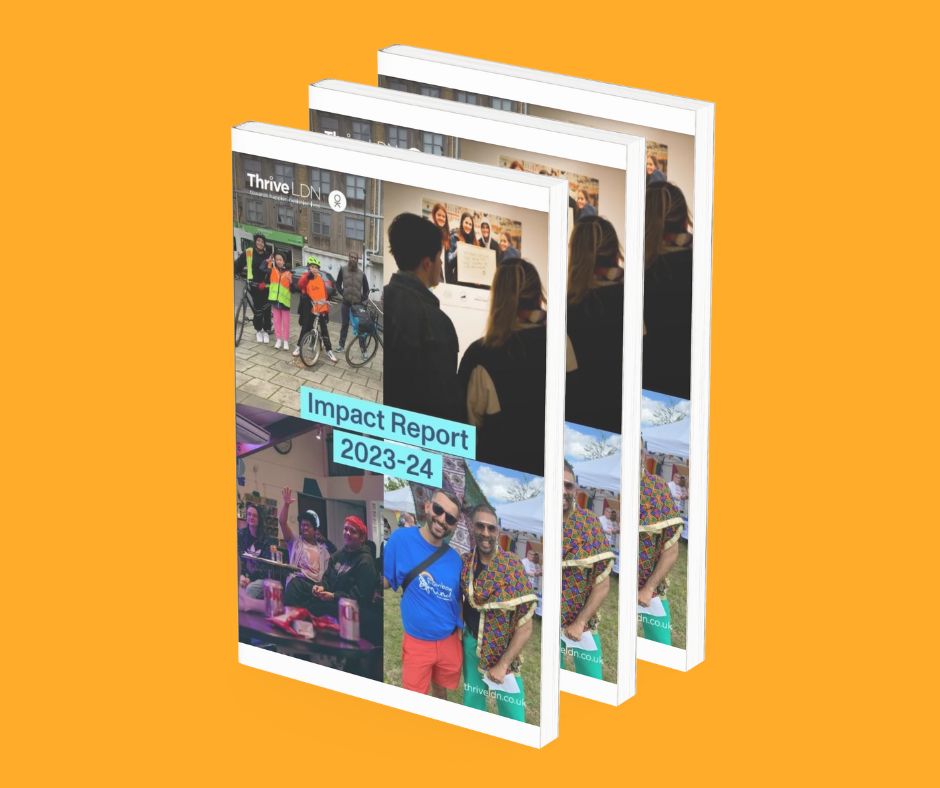
Report
Updated: 01/08/2024
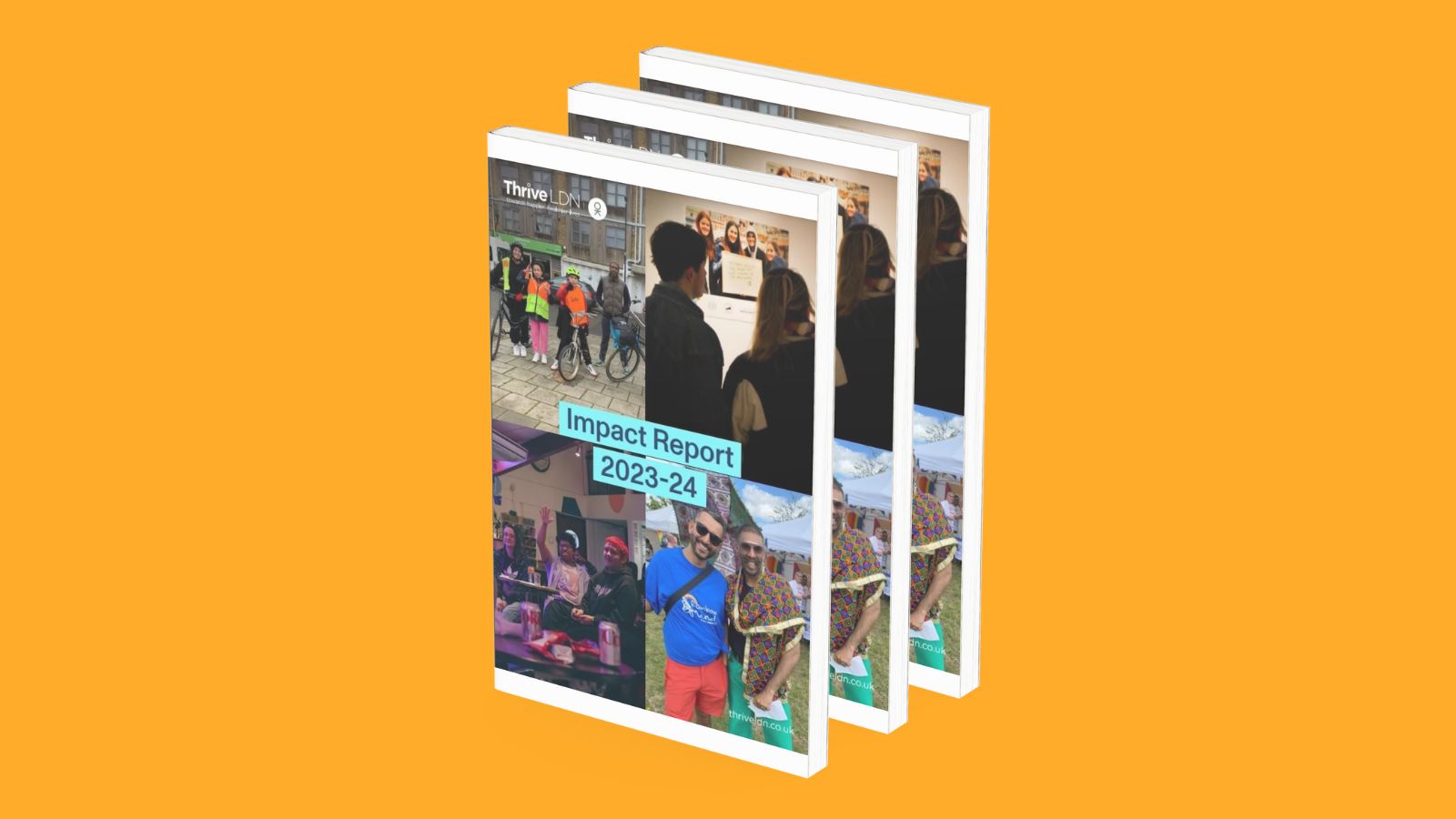
PDF download
Download a designed version of this report in PDF.
The Mayor of London’s Health Advisor, Dr Tom Coffey, said: “The Mayor and I are proud that, as a result of investment from City Hall, Thrive LDN has been able to work with communities to help tackle the mental health challenges faced by Londoners. Sadly, far too many people across the capital experience difficulties with their mental health, but this impact report shows what can be achieved when we work in partnership. Sadiq is committed to building a fairer, healthier city for all and Thrive LDN’s forward thinking approach is vital in addressing mental health inequalities.”
01. Executive summary
Executive summary: evolving to meet Londoners’ needs
This report details Thrive LDN’s impactful work in 2023/24. In this year’s report we tell the story of how Thrive LDN has continued to evolve as a citywide public mental health partnership to ensure all Londoners have an equal opportunity for good mental health and wellbeing.
During this period there has been significant change, both positive and challenging, for London and the world. We have adapted to address these challenges while staying true to our core mission: for all Londoners to have a fair and equal exposure to the social, economic, and physical factors which shape good mental health and wellbeing.
Adapting to change
Chapter 2 explores Thrive LDN’s changing role, in a changing world. Alongside sharing our change methodologies and iterations to our collective theory of change. It isn’t a perfect illustration, but it outlines a snapshot of how we are working together to meet our long-term goal of giving all Londoners equal opportunities for good mental health and wellbeing.
2023/24 highlights
As with previous impact reporting, we do not attempt to offer a comprehensive reflection of all our activities during the last year but instead share some key highlights which illustrate the achievements of the partnerships, processes and networks which make up Thrive LDN.
For Chapter 3, we’ve gathered some of the key stories of people, processes, partnerships, and their impact across four key areas:
1. Distributed leadership: We empower a network of partners to share decision-making and ownership of mental health outcomes across London. This year’s highlights include:
- Expansion of the Real-Time Surveillance System (RTSS) to monitor self-harm data, crucial for early intervention in suicide prevention.
- Improved communication and collaboration among Economic Wellbeing Forum partners to address the mental health impact of the cost-of-living crisis.
- Leading the development of a national research infrastructure to inform mental health policy and practice.
2. Community building and sustainability: We continue to celebrate and protect diversity in London, especially for those at higher risk of unfair treatment based on their identity, beliefs, or social class, and in some cases a combination of these. This year’s report reflects upon:
- The 13 local grassroots organisations supported through Right to Thrive, which reached more than 6,000 participants from diverse communities across London.
- How we have, as part of the GLA’s Hong Kong Integration Programme, stepped up a programme to support Hong Kong arrivals in London.
3. Equity, diversity, and inclusion: How we have prioritised equity in our work, working towards a city whereby all Londoners, regardless of background, have equal access to mental health support.
4. Collaboration and co-creation: How the partnership plays a vital role in coordinating efforts as part the Mayor’s Mental Health Recovery Mission for the 2023/24, spotlighting key initiatives including:
- Great Mental Health Day and this year’s #ThroughTogether campaign have supported Londoners’ resilience during challenging times through increased participation and engagement, fostering open conversations about mental health across London.
- The story of collaboration with young Londoners to develop creative solutions to address youth mental health challenges through the conclusion of a series of cultural or arts-based projects.
Looking ahead
Thrive LDN remains a powerful force for positive change in London’s mental health landscape. There continues to be no shortage of challenges facing London and we look forward to building on the work described in this report.
Our thanks to all those who have supported Thrive LDN and worked with us this year. You can get involved and join the conversation now:
- Across all social media channels using @ThriveLDN or #ThroughTogether.
- Email us at info@thriveldn.co.uk
02. Thrive LDN’s changing role
Thrive LDN’s changing role, in a changing world
Thrive LDN is a citywide public mental health partnership which has evolved and grown since its inception in 2016. In this time, we have created opportunities and supported Londoners, communities and healthcare partners across the capital to come together to challenge and improve outcomes, creating meaningful change for mental health and wellbeing.
Since Thrive LDN was launched we have seen astronomical change, at a rate unimaginable back in 2016. These changes have been positive and negative, and very often they are not mutually exclusive. Both London and the world we live in are now very different places. The health and social care system and field of public mental health have completely transformed. Today, we find ourselves in interesting times, where global risks are constantly shifting and continued uncertainty is now the norm, but also where the power of community action is more apparent than ever, and the depth of Londoners’ compassion and solidarity is clear to see.
This report provides a snapshot for 2023/24 of how Thrive LDN, and the complex collection of partners, places, and people we represent, has created lasting impact for the city and recognises the strength of our collective processes.
For a deeper insight into Thrive LDN’s journey so far, please see Thrive LDN & The Mayor of London: Eight Years Of Public Mental Health Achievements (March 2024).
2.1 Theory of change
A collective theory of change
The backbone of Thrive LDN is an unwavering commitment to understanding, influencing and driving change. A huge part of our focus is on identifying and addressing processes that challenge inequality, promote equity, and enhance participation.
By doing so, we are creating an environment which will bring us closer to our long-term goal of giving all Londoners equal opportunities for good mental health and wellbeing.
While our practical capabilities of communications, programmes and research, insights and evaluation functions are well known across the partnership, they are underpinned by change methodologies and a collective theory of change. Thrive LDN address four types of change (Figure 1) to understand the relationships between policy, infrastructure, perception, and behaviour:
- Policy – strengthening existing policy outcomes.
- Infrastructure – what already exists in terms of processes and what could be put in place to address challenges.
- Perception – how current views and public discourses may impact desired change outcomes, with the view of influencing these.
- Behaviour – compelling shifts in individual habits and behaviour.
Figure 1. Thrive LDN addresses four types of change
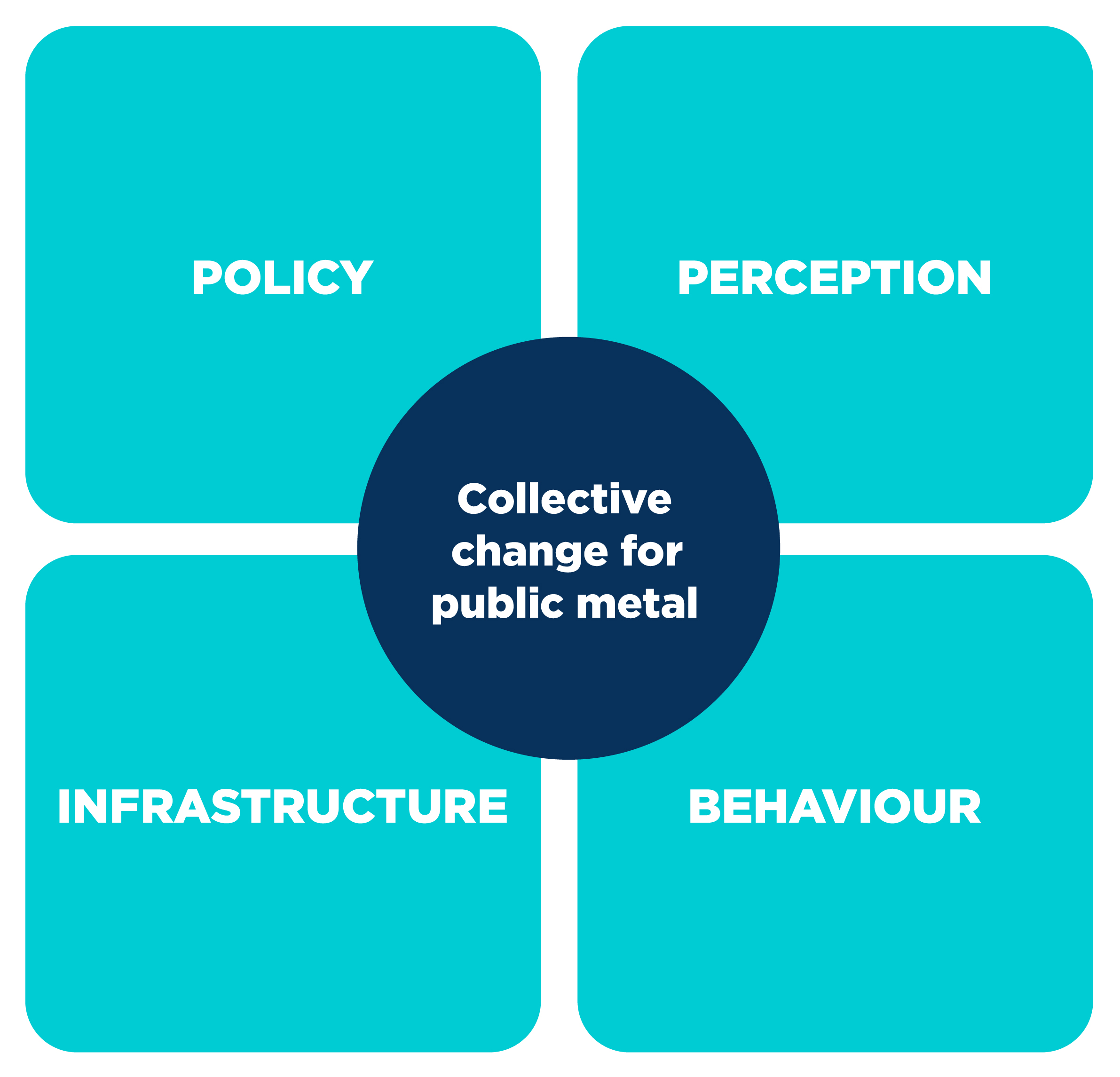
Equity and participation remain at the heart of achieving change. We will continue to address some of these through new partnerships and projects in the coming year.
Figure 2 shows how solutions are developed for complex London-wide problems and how all aspects of change are approached. It isn’t a perfect illustration of how Thrive LDN drives change or of all the work of the wider public mental health partnership we represent, but it outlines a snapshot of how we are working together to achieve outcomes and impact for Londoners.
“We cannot find solutions in one part of the system – we need synergistic action and leadership to get to our desire outcomes. Public mental health is not the responsibility of any one player.” Professor Kevin Fenton CBE, Regional Public Health Director for London
Figure 2. Thrive LDN’s Theory of Change (2024)
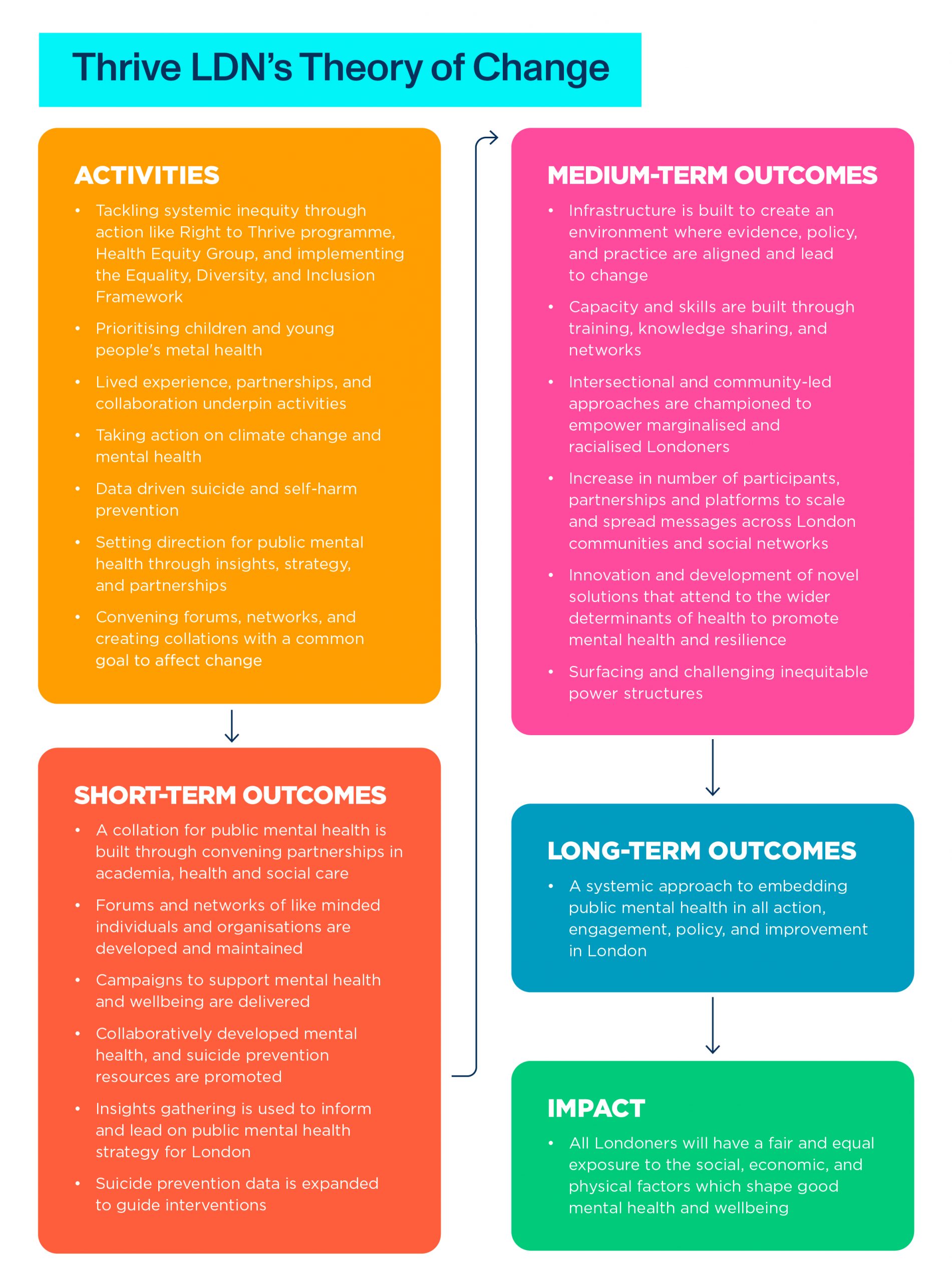
03. Working together
We’re working together to improve mental health and wellbeing
How have we collectively driven change in 2023/24? We’ve gathered some of the stories of people, processes, partnerships, and their impact that have been the highlights of our year.
Our internal framework (Figure 3) shows how we work to advance social change through a blend of bottom-up and top-down approaches(1). The principles of distributed leadership, collaboration and co-creation, and community building and sustainability all foster an environment where power is more distributed, participatory, and fluid.
We believe that this leads to a more dynamic, inclusive, and effective infrastructure for public mental health.
Figure 3. How Thrive LDN works to advance social change
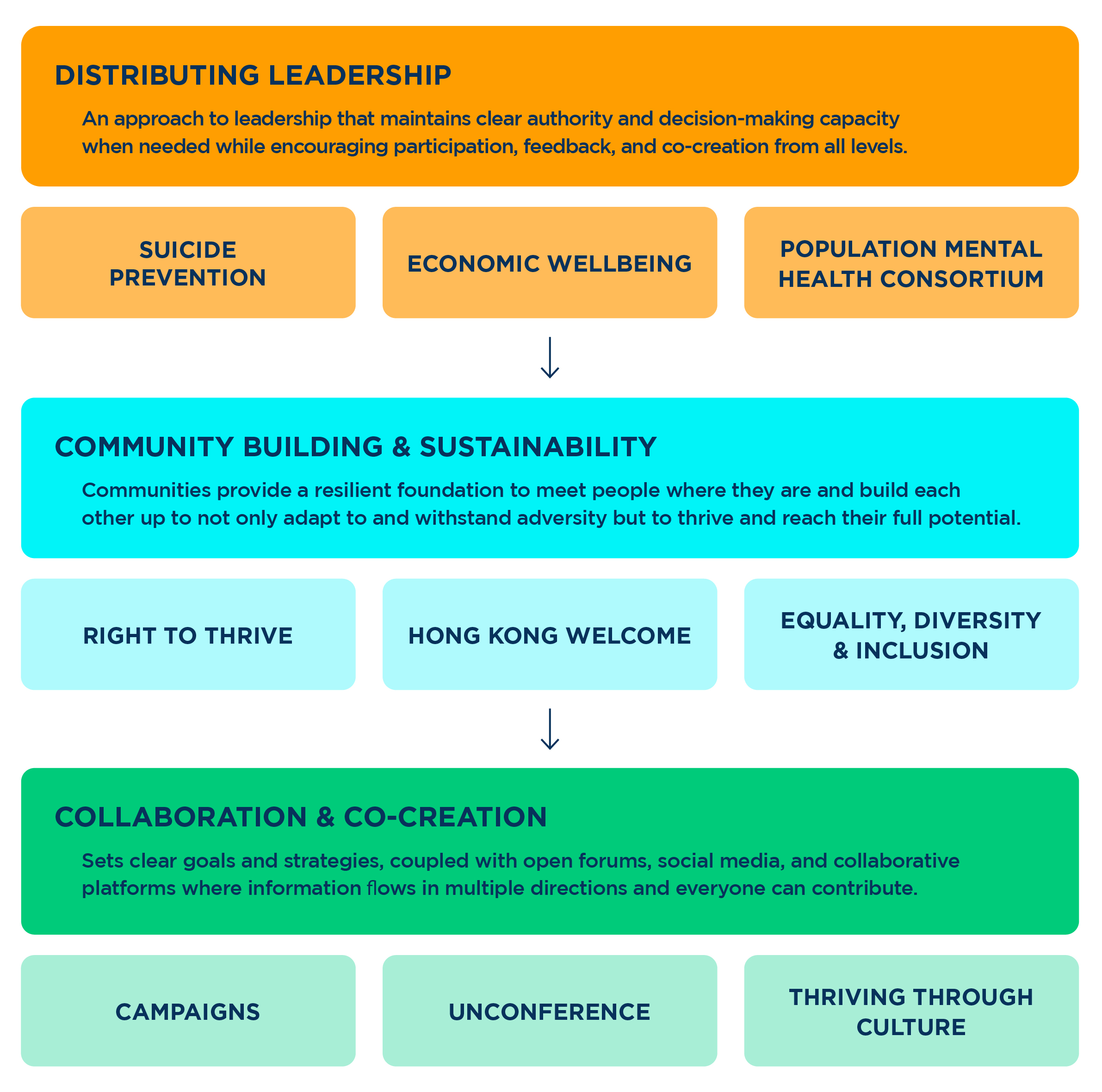
(1) Timms, H. & Heimans, J. (2018) New Power: How Power Works in Our Hyperconnected World – and How to Make it Work for You
3.1 Distributed leadership
Distributed leadership
A distributed approach to leadership is one which maintains clear authority and decision-making capacity when needed while encouraging participation, feedback, and co-creation from all levels. Thrive LDN’s regional oversight of suicide prevention across the region, the facilitation of London’s economic wellbeing forum and role as coalition builders within UKRI’s Population Mental Health Consortium are clear examples of how control and decision-making is shared among many rather than centralised.
Suicide Prevention
Essential to London’s success in the prevention of suicide is the leadership and collaboration of multi-agency partners. As the regional lead for suicide prevention in London on behalf of NHS England, Thrive LDN facilitates the multi-agency Suicide Prevention Group (SPG) delivering citywide projects to prevent suicide and support those affected by suicide.
The group is made up of over 40 organisations and people with lived experience, who lead with courage and compassion as well as with an explicit focus on real-time data driven change. The SPG has been a key enabler of regional, sub-regional and local suicide prevention and postvention activities, including championing the development of London’s Real-Time Surveillance Systems (RTSS).
In 2023/24, the RTSS was expanded to include information on intentional self-harm, advancing the established partnership and data sharing arrangements between London partners. This is particularly significant as a recent episode of self-harm is one of the biggest Real-time monitoring of the incidence, methods, and demographic trends relating to self-harm is essential in the development of short- and long-term suicide prevention strategies.
London’s SPG and RTSS are pioneering collaborative partnerships working to share best practice, oversee the delivery of citywide projects to prevent suicide, and support those affected by suicide.
London’s Economic Wellbeing Forum
The Thrive LDN Economic Wellbeing Forum (EWF) plays a crucial role in addressing the ongoing impact of the cost-of-living crisis on population mental health. By engaging frontline workers, community organisations, and diverse stakeholders, the forum identifies groups in need, fosters networking, and shares best practices to support those experiencing financial anxiety.
Through strategic activities and partnerships, in 2023/24 the EWF has achieved notable impacts:
- Improved communication among members has facilitated networking and knowledge sharing, enhancing the forum’s effectiveness as a pan-London platform.
- Feedback from members has informed iterative projects, leading to tailored initiatives such as online resilience workshops and targeted money guidance programmes.
- Recognition from external stakeholders, including the London Assembly, underscores the forum’s relevance and influence in supporting Londoners through increased cost-of-living pressures.
Key activities implemented by the EWF, funded as part the Mayor’s Mental Health Recovery Mission include workplace resilience workshops conducted in partnership with Healthy Dialogues, a half-day Unconference facilitated by Basis, and a pilot program with Clean Slate to support individuals on lower incomes.
These activities not only address immediate needs but also lay the groundwork for long-term strategies to enhance economic wellbeing and mental health resilience across London.
“I managed to join it and it was an excellent session.”
“Thank you very much, the previous sessions I attended were really good and helpful.”
“Must say, this (Thrive LDN) is an excellent initiative. Well done to all!”
UKRI-funded research partnerships
Despite the consensus that poor mental health has a significant impact on the global disease burden, only 3.9% of funding into mental health research is spent on prevention research.
Addressing this gap, Thrive LDN is redefining how evidence about mental health is made and used.
To do that, we are building a research environment, bringing together experts in experience, evidence, policy and practice by co-creating collaborative infrastructures. Our world-leading collaborators include data researchers, anthropologists, ethnographers, system leaders, people with lived experience and diverse communities, and we link these partners directly to decision-makers and policy forums.
The research environment integrates lived experience, policy and practice into a range of methodological approaches. Together with Kings College London, we are leading the UKRI-funded Population Mental Health Consortium, expanding the possibilities of data-driven research. Our role is to amplify the immense potential of national datasets by building in an inclusive and intersectional approach to analysis with over 10 leading partner organisations across the UK.
Alongside our quantitative work, we are bringing the voice of lived experience and policy into the study of the social dynamics, relationships and daily practices of mental health care. This will ensure the complex and intersectional mental health needs of London’s diverse populations are centred in world-leading anthropological research. We are achieving this through the new UKRI-funded Centre for Anthropology and Mental Health Research in Action, hosted by SOAS.
These partnerships build on those developed since 2019 with the Centre for Society and Mental Health, Toynbee Hall, ADPH London, the GLA, OHID, and grassroots community organisations across London. These partnerships have attracted investment of £15 million, showcasing London as a global exemplar in collaborative public mental health research.
3.2 Community
Community building and sustainability
Communities provide a resilient foundation to meet people where they are and build each other up, to not only adapt to and withstand adversity but crucially to thrive and reach their full potential. Thrive LDN’s role in building and sustaining of communities can be seen though the legacy of Right to Thrive, our active role in London’s Hong Kong Integration Programme and an ongoing commitment to equality, diversity and inclusion (EDI).
Right To Thrive
Between January and March 2024, thirteen local grassroots organisations were supported through Right to Thrive funding and engaged with more than 6,000 participants, spanning 27 London boroughs. They provided mental health and wellbeing support to children and young people (CYP) and their carers, racialised and minoritized communities, LGBTQIA+ led organisations, disabled Londoners, and those with long term conditions with an intersectional identity.
The 13 local grassroots organisations were:
Connect: North Korea – a project promoting health and wellbeing in the North Korean refugee community.
Diversity Living Services – the Stand up for Better Mental Health project promoted better mental health in racialised and minoritised communities in Enfield through community engagement and co-development of Better Mental Health guide, that has been distributed across the community and health and care professionals.
Gold & Silver Interprises CIC with Sewn Together – a project that empowered women from black communities to improve their health and wellbeing by offering free opportunities to learn new life skills, access local services and shape the future of their community.
Hammersmith, Fulham, Ealing and Hounslow Mind – the Mind on Music project involved workshops that aimed to get young people to talk about mental health through music.
Home Start Bromley in partnership with Yakira – the Supporting Black Motherhood project supported local first-time black mothers who are in the latter stages of pregnancy and who have a history of mental health or experiencing poor mental health during pregnancy through free one-to-one peer mentoring and support, access to counselling sessions and a group pscyho-education programme.
Lewisham Youth Theatre – the Feeling Creative project and Keeping in Touch Drop-Ins supported vulnerable young people aged 18-25 to engage with and continue to participate in free participatory theatre activities as an intervention tool, helping them build enduring skills, resilience and ambition to improve their long-term wellbeing and achieve their potential.
Micro Rainbow – the Alive and Kicking project, in partnership with Made in Hackney, supported LGBTQ+ asylum seekers and refugees by providing psycho-educational and wellbeing sessions, providing coping strategies and ways to improve wellbeing and resilience.
Mind in the City, Hackney, and Waltham Forest – the Rainbow Right to Thrive project, championing LGBTQ+ mental health in the community, is a partnership between Rainbow Mind and IRIE Mind, to deliver inclusive and caring mental health and emotional wellbeing support to those of both Black African and Caribbean people (BAPOC) and LGBTQIA+ lived experience and especially those at intersections of both.
Parent Skills2Go CIC – My Child and Me was a transformative course dedicated to nurturing the mental health and wellbeing of marginalized families with children with learning difficulties and disabilities.
Powerhouse for Women – the Powerhouse Wellbeing project aimed to improve mental health and wellbeing of women with learning disabilities in Newham through weekly therapeutic art session, monthly psychodrama sessions, and workshop on stress and anxiety management.
Queer Diary CIC – diary-readings, open-mic nights, and zine-making workshops were delivered for LGBTQIA+ adults in Lewisham and Southwark to share coming-of-age moments and personal histories, connecting a broad community of LGBTQIA+ through live events and creative workshops.
The Albany & REZON8 – the REZON8 project supports creative output for young people through free recording sessions for 14-25 year olds, to help young people talk about their thoughts and feelings through music to support young people with their mental health, specifically thinking about the process of improving emotional literacy as well as developing mechanisms for self-expression and reflection all while using music as the tool.
UpCycle LDN – ‘Earn-ya-Bike’ was a project that supported racialised and minoritised young Londoners to develop new cycle skills and improve their wellbeing through one-to-one mentoring, bike repair classes and safe cycling workshops.
Hong Kong Integration Programme
As part of the GLA’s Hong Kong Integration Programme, Thrive LDN stepped up a programme of work to support the mental health and wellbeing of Hong Kong arrivals in London, including trauma informed training, tailored suicide prevention activities, a grants scheme, and a participatory film project.
Partnering with Wave Trust and Hong Kong Well UK, a bespoke training program was created to address the unique experiences and needs of young Hongkongers. The collaboration resulted in culturally specific content that received overwhelmingly positive feedback, with over 80% of participants expressing increased confidence and understanding.
“The Hong Kong information was spot on and the weaving of trauma-informed practice was well done. Excellent training and trainer.”
In partnership Ethical Creatives and Hackney Chinese Community Services a short film “Where My Heart Belongs” was co-produced with the Hong Kong community. This project empowered participants to express their emotions and process distress by engaging in the creative process of filmmaking.
It focused on the lived experiences of LGBTQ+ Hongkongers and other intersectional groups identified by the community, providing a platform for these voices to share their journeys of arriving and settling in London. Broadcast at a curated community film screening, this allowed the wider community to collectively explore mental health and the challenges of migration.
3.3 EDI
Equity, diversity, and inclusion
Across 2023-24, Thrive LDN has built upon previous progress by refining an equality, diversity, and inclusion (EDI) framework to strengthen our strategic focus on informing and influencing actions to drive health equity.
The commitment and insight of leaders such as Cllr Dr Jacqui Dyer MBE and Marie Gabriel CBE provides a unique opportunity to redefine systemic rules and goals, combined with a system-wide mandate to improve access, experience, and outcomes for racialised and culturally diverse communities. The publication of the Building a Fairer City Action Plan, the NHS Race and Health Observatory, and the Patient and Carer Race Equality Framework (PCREF) has created strategic opportunities at both regional and sub-regional levels, fostering consensus on reducing inequalities, discrimination, and oppression.
“Of all the forms of inequality, injustice in health is the most shocking and the most inhuman…” Dr Martin Luther King, Jr
3.4 Collaboration
Collaboration and co-creation
A collaborative environment fosters co-creation, where everyone’s ideas and experiences enhance outcomes. As seen through our approach to campaigning and bringing people together, Thrive LDN combines clear goals and strategies with open forums, digital communications, and regional events where people contribute ideas, share experiences, and work together on solutions.
Campaigns
Thrive LDN plays a leading role in coordinating public mental health communications and campaigns across London to meet the challenges of supporting mental health and making the best use of finite resources.
The #ThroughTogether campaign is a vital community-led initiative designed to support Londoners’ resilience during challenging times. Funded as part the Mayor’s Mental Health Recovery Mission for the 2023/24 period, this campaign encourages open conversations about mental health while providing essential resources and support.
Key elements included expert wellbeing videos and powerful storytelling initiatives that highlight how individuals and groups across London are making a difference. These stories, available in both video and written formats, showcase the work of organisations such as Andy’s Man Club London, Mindful Mums, and Run Talk Run and many others.
Great Mental Health Day (GMHD) 2024, held on Friday, 26 January 2024, highlighted ‘meaningful connections’, emphasising the power of relationships, community, and social networks. GMHD started in Haringey in 2022 as a campaign to encourage residents to talk about mental health, destigmatise asking for help and raise awareness about the available support. Since then, Thrive LDN has worked closely with Haringey and regional partners to scale the campaign across London, ensuring continued success in planning and delivering GMHD each year as a key citywide mental health and wellbeing campaign.
- Close to 5,000 Londoners celebrated Great Mental Health Day 2024
- Around 3,000 Londoners participated through in-person events held across the city
- 60+ events took place spanning 15 London boroughs
- 13,000+ unique visits to the GMHD web pages in January 2024
On social media, Londoners shared their own thoughts, experiences, pictures, and videos:
- 1,000+ tweets including #GreatMentalHealth or #GreatMentalHealthDay
- On Instagram, Great Mental Health Day posts reached almost 9,000 users
- 25,000 views from across a range of videos posted by Londoners
- 10,000s of views, across all platforms, for the GMHD Connections 24 film by Messages of Hope and The Speakers Collective
- Six ‘Through Together’ video stories received 17,000+ views on Instagram
“It highlights how important everyone’s wellbeing is”
“It has opened up a safe space for people to speak freely about their mental health”
“It gives people a great understanding of Mental Health issues”
“If other people have done the same as me today, this will help Londoners have important conversations about suicide.”
The Together LDN Unconference
The Together LDN Unconference, held in March 2024, flipped power dynamics, where instead of a set agenda, participants suggested and selected the conversations that mattered to them.
Evolving from discussions within the Economic Wellbeing Forum and through the Mayor’s Mental Health Recovery Mission, this online event prioritised participant-driven dialogue, providing a safe and comfortable space for Londoners interested in health and wellbeing to engage in spontaneous conversations. Its informal, participant-led structure fostered a sense of community and collaboration, steering away from a prescriptive agenda and instead amplifying voices often unheard in traditional settings.
With over 100 participants engaging throughout the event, the Together LDN Unconference facilitated meaningful conversations across a range of topics, including workplace mental health, funding, and effective communication. Notably, smaller community organisations found value in the event, highlighting its importance in fostering collaboration despite funding constraints and staff wellbeing challenges.
Over 90% of participants rated the event positively, praising its dynamic environment and open approach to dialogue, with feedback highlighting the Together LDN’s role in forging connections and inspiring innovative approaches to partnership working.
“So much optimism for change and willingness to work together. Thank you!”
“That was a fantastic event. I came back to [my] team really excited by both by the conversations I’d had and also the format. It created such a dynamic environment for conversation.”
Thriving Through Culture
Thriving Through Culture, a collaborative initiative between Thrive LDN, the Greater London Authority’s Creative Industries and Culture Unit, and The Baring Foundation, concluded its series of cultural programmes to bolster children and young people’s mental health during 2023/24.
The final year of the Thriving Through Culture built on the publication of A Manifesto for 2.8 Million Minds (May 2022), a collection of ideas for how young Londoners want to use art to begin to radically reimagine mental health support, justice and pride, written and developed by more than 120 young Londoners, and the Access All Areas festival, hosted at City Hall on World Mental Health Day 2022, the programme for which was designed by young Londoners.
Held at the end of February 2024, the Rewire Youth Summit explored the role of creativity and culture in addressing the acute mental health crisis among young people. The summit, co-created by a panel of young people, was final initiative of the Thriving through Culture three-year programme and culminated years of work across two separate days at Boundless Theatre in partnership with Stanley Arts.
The summit’s first day, held on Saturday, was for young Londoners themselves and focused on participatory experiences and workshops. Two days later, a full room of health and care leaders engaged in discussions based on insights from young people involved in the summit and wider Thriving through Culture initiatives.
Through the Thriving through Culture partnership, young Londoners have benefited from training through grants, festivals, webinars, and participatory research to reflect their creativity. It has demonstrated how the transformative potential of art and culture can support young Londoners’ mental health.
The Rewire Youth Summit engaged more than 200 young people, families, community partners, and system leaders through a variety of creative activities.
Positive impacts felt by the young people involved in the Rewire Youth Summit included:
- An increased sense of confidence
- New skills, including public speaking and working as a team
- Playing a part in some important and developed ideas
- Having their voices heard
- Having the opportunity to be surrounded by like- minded people
- A safe space to be themselves, to ask questions and learn
- Finding new ways of supporting their wellbeing through art and creativity